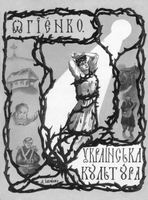|
Metropolitan Ilarion (Ivan Ohienko)
Metropolitan Ilarion (secular name Ivan Ivanovitch Ohienko; uk, Іван Іванович Огієнко; 2 January (14 January), 1882 in Brusilov, Kiev Governorate – 29 March 1972 in Winnipeg, Manitoba, Canada) was a Ukrainian Orthodox cleric, linguist, church historian, and historian of Ukrainian culture. In 1940 he was Archimandrite of the St. Onuphrius Monastery in Jableczna; in 1940 he became Bishop of Chełm; in 1944 he became the Metropolitan of Chełm and Lublin (Podlaskie), and in 1951 Primate of the Ukrainian Orthodox Church of Canada). He was also active in Ukrainian politics, both during the revolution and later in emigration. Early life Ivan Ohienko was born in central Ukraine ( Kiev Gubernia) and educated at Kiev University where he studied Slavic philology (see Slavistics) under V. Peretts. By 1915, he was teaching at this same university, and during the revolution became active in the Ukrainianization of higher education. In 1919, he was Minister of Educa ... [...More Info...] [...Related Items...] OR: [Wikipedia] [Google] [Baidu] |
Brusyliv, Zhytomyr Oblast
Brusyliv ( uk, Брусилів, russian: link=no, Брусилов) is an urban-type settlement in Zhytomyr Raion, eastern part of Zhytomyr Oblast, northern Ukraine. Brusyliv is the center of the Brusyliv urban hromada, being situated on the river Zdvyzh. It has the status of an urban-type settlement since 1979. Population: Geography Brusyliv is situated 29 km from the railway station Skochyshche, 56 km from Zhytomyr Zhytomyr ( uk, Жито́мир, translit=Zhytomyr ; russian: Жито́мир, Zhitomir ; pl, Żytomierz ; yi, זשיטאָמיר, Zhitomir; german: Schytomyr ) is a city in the north of the western half of Ukraine. It is the administrative ... by railway and by 78 km by highway. First historical mention dates to 1543. Postal code for Brusyliv is 12605 and telephone code is +380-4162 (with international prefix +380). Mayor of the town in 2006 was Leonid Rybets. Famous personalities * Ivan Ohienko (1882–1972) – Ukrainian linguist ... [...More Info...] [...Related Items...] OR: [Wikipedia] [Google] [Baidu] |
Second Polish Republic
The Second Polish Republic, at the time officially known as the Republic of Poland, was a country in Central Europe, Central and Eastern Europe that existed between 1918 and 1939. The state was established on 6 November 1918, before the end of the First World War. The Second Republic ceased to exist in 1939, when Invasion of Poland, Poland was invaded by Nazi Germany, the Soviet Union and the Slovak Republic (1939–1945), Slovak Republic, marking the beginning of the European theatre of World War II, European theatre of the Second World War. In 1938, the Second Republic was the sixth largest country in Europe. According to the Polish census of 1921, 1921 census, the number of inhabitants was 27.2 million. By 1939, just before the outbreak of World War II, this had grown to an estimated 35.1 million. Almost a third of the population came from minority groups: 13.9% Ruthenians; 10% Ashkenazi Jews; 3.1% Belarusians; 2.3% Germans and 3.4% Czechs and Lithuanians. At the same time, a ... [...More Info...] [...Related Items...] OR: [Wikipedia] [Google] [Baidu] |
Tarnów
Tarnów () is a city in southeastern Poland with 105,922 inhabitants and a metropolitan area population of 269,000 inhabitants. The city is situated in the Lesser Poland Voivodeship since 1999. From 1975 to 1998, it was the capital of the Tarnów Voivodeship. It is a major rail junction, located on the strategic east–west connection from Lviv to Kraków, and two additional lines, one of which links the city with the Slovak border. Tarnów is known for its traditional Polish architecture, which was influenced by foreign cultures and foreigners that once lived in the area, most notably Jews, Germans and Austrians. The Old Town, featuring 16th century tenements, houses and defensive walls, has been preserved. Tarnów is also the warmest city of Poland, with the highest long-term mean annual temperature in the whole country. Companies headquartered in the city include Poland's largest chemical industry company Grupa Azoty and defence industry company ZMT. The city is currently ... [...More Info...] [...Related Items...] OR: [Wikipedia] [Google] [Baidu] |
Directorate Of Ukraine
The Directorate, or Directory () was a provisional collegiate revolutionary state committee of the Ukrainian People's Republic, initially formed on November 13–14, 1918 during a session of the Ukrainian National Union in rebellion against Ukrainian State, Skoropadsky's regime. During the overthrow of Pavlo Skoropadsky it was named as the ''Executive Council of the State Affairs'' (). Its authority was extended by the Labor Congress of Ukraine on January 23–28, 1919. After unsuccessful attempts to gather members of the committee, it dissolved on November 10, 1920. On November 12, 1920 by the Law on the Temporary Supreme Authority and the Legislative System of the UNR, the executive council was reformed into a single person government position. Overview The Directorate was formed until a new council was to be elected to form the professional government. It was decided not to restore functioning of the Central Rada which was favored by the Ukrainian Socialist-Revolutionary Par ... [...More Info...] [...Related Items...] OR: [Wikipedia] [Google] [Baidu] |
Ukrainian People's Republic
The Ukrainian People's Republic (UPR), or Ukrainian National Republic (UNR), was a country in Eastern Europe that existed between 1917 and 1920. It was declared following the February Revolution in Russia by the First Universal. In March 1917, the National Congress in Kyiv elected the Central Council composed of socialist parties on the same principles as throughout the rest of the Russian Republic. The republic's autonomy was recognized by the Russian Provisional Government. Following the October Revolution, it proclaimed its independence from the Russian Republic on 22 January 1918 by the Fourth Universal. During its short existence, the republic went through several political transformations – from the socialist-leaning republic headed by the Central Council of Ukraine with its general secretariat to the socialist republic led by the Directorate and by Symon Petliura. Between April and December 1918, the socialist authority of the Ukrainian People's Republic was sus ... [...More Info...] [...Related Items...] OR: [Wikipedia] [Google] [Baidu] |
Ukrainianization
Ukrainization (also spelled Ukrainisation), sometimes referred to as Ukrainianization (or Ukrainianisation) is a policy or practice of increasing the usage and facilitating the development of the Ukrainian language and promoting other elements of Ukrainian culture in various spheres of public life such as education, publishing, government, and religion. The term is also used to describe a process by which non-Ukrainians or Russian-speaking Ukrainians come to accept Ukrainian culture and language as their own. A major early case of Ukrainization relates to the Soviet indigenization policy of the 1920s (''korenizatsiya'', literally "putting down roots"), which aimed at strengthening Soviet power in the territory of Soviet Ukraine and in southern regions of the Russian SFSR. In various forms, Ukrainization policies also played out in several different periods of the 20th-century history of Ukraine, although with somewhat different goals and in different historical contexts. Ukrain ... [...More Info...] [...Related Items...] OR: [Wikipedia] [Google] [Baidu] |
Slavistics
Slavic (American English) or Slavonic (British English) studies, also known as Slavistics is the academic field of area studies concerned with Slavic areas, languages, literature, history, and culture. Originally, a Slavist or Slavicist was primarily a linguist or philologist researching Slavistics. Increasingly, historians, social scientists, and other humanists who study Slavic area cultures and societies have been included in this rubric. In North America, Slavic studies is dominated by Russian studies. Ewa Thompson, a professor of Slavic studies at Rice University, described the situation of non-Russian Slavic studies as "invisible and mute." History Slavistics emerged in late 18th and early 19th century, simultaneously with Romantic nationalisim among various Slavic nations, and ideological attempts to establish a common sense of Slavic community, exemplified by the Pan-Slavist movement. Among the first scholars to use the term was Josef Dobrovský (1753–1829). The his ... [...More Info...] [...Related Items...] OR: [Wikipedia] [Google] [Baidu] |
Ukraine After The Russian Revolution
Various factions fought over Ukrainian territory after the collapse of the Russian Empire following the Russian Revolution of 1917 and after the First World War ended in 1918, resulting in the collapse of Austria-Hungary, which had ruled Ukrainian Galicia. The crumbling of the empires had a great effect on the Ukrainian nationalist movement, and in a short period of four years a number of Ukrainian governments sprang up. This period was characterized by optimism and by nation-building, as well as by chaos and civil war. Matters stabilized somewhat in 1921 with the territory of modern-day Ukraine divided between Soviet Ukraine (which would become a constituent republic of the Soviet Union in 1922) and Poland, and with small ethnic-Ukrainian regions belonging to Czechoslovakia and to Romania. Alliance and strife After the abdication of Tsar Nicholas II, Ukrainian community leaders were able finally to organized the Central Rada in Kyiv (''Tsentral’na rada''), headed ... [...More Info...] [...Related Items...] OR: [Wikipedia] [Google] [Baidu] |
Ukrainian Orthodox Church Of Canada
The Ukrainian Orthodox Church of Canada (UOCC; french: Église orthodoxe ukrainienne du Canada) is an Eastern Orthodox church in Canada, primarily consisting of Orthodox Ukrainian Canadians. Its former name (before 1990) was the Ukrainian Greek Orthodox Church of Canada (UGOCC). The Church, currently a metropolis of the Ecumenical Patriarchate of Constantinople, is part of the wider Eastern Orthodox communion, however was created independently in 1918. It has cathedrals in many Canadian cities including Winnipeg, Saskatoon, Vancouver, Edmonton, Toronto, and Montreal. The Metropolitan Cathedral, seminary ( St. Andrew's College), and central administrative office are all based in Winnipeg. Also the church is affiliated with four residences for university students: St. Vladimir Institute in Toronto, Ontario; St. Petro Mohyla Institute in Saskatoon, Saskatchewan; St. John's Institute in Edmonton, Alberta; and one operating at St. Andrew's College. The church's membership is ab ... [...More Info...] [...Related Items...] OR: [Wikipedia] [Google] [Baidu] |
Primate (bishop)
Primate () is a title or rank bestowed on some important archbishops in certain Christian churches. Depending on the particular tradition, it can denote either jurisdictional authority (title of authority) or (usually) ceremonial precedence (title of honour). Roman Catholic Church In the Western Church, a primate is an archbishop—or, rarely, a suffragan or exempt bishop—of a specific (mostly metropolitan) episcopal see (called a ''primatial see'') who has precedence over the bishoprics of one or more ecclesiastical provinces of a particular historical, political or cultural area. Historically, primates of particular sees were granted privileges including the authority to call and preside at national synods, jurisdiction to hear appeals from metropolitan tribunals, the right to crown the sovereign of the nation, and presiding at the investiture (installation) of archbishops in their sees. The office is generally found only in older Catholic countries, and is now ... [...More Info...] [...Related Items...] OR: [Wikipedia] [Google] [Baidu] |
Podlaskie
Podlaskie Voivodeship or Podlasie Province ( pl, Województwo podlaskie, ) is a voivodeship (province) in northeastern Poland. The name of the province and its territory correspond to the historic region of Podlachia. The capital and largest city is Białystok. It borders on Masovian Voivodeship to the west, Warmian-Masurian Voivodeship to the northwest, Lublin Voivodeship to the south, the Belarusian oblasts of Grodno and Brest to the east, the Lithuanian Counties of Alytus and Marijampolė to the northeast, and the Kaliningrad Oblast of Russia to the north. The province was created on 1 January 1999, pursuant to the Polish local government reforms adopted in 1998, from the former Białystok and Łomża Voivodeships and the eastern half of the former Suwałki Voivodeship. Etymology The voivodeship takes its name from the historic region of Poland called ''Podlasie'', or in Latin known as Podlachia. There are two opinions regarding the origin of the region's name. People oft ... [...More Info...] [...Related Items...] OR: [Wikipedia] [Google] [Baidu] |




.jpg)

